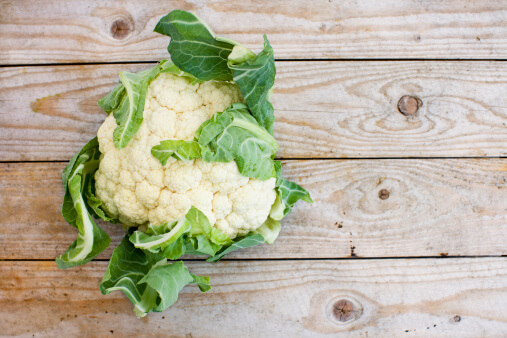Calling on Cauliflower! Your Health Benefits Speak To Us
8 years ago | Nutrition
By Joy Stephenson-Laws, JD, Founder
It’s Monday, and if you want to take an extra step in being proactive about your health, make today a #MeatlessMonday. If you go meatless every Monday for a year (52 days total), you may reduce your risk of certain diseases including cancer, heart disease and more.
So let’s take a closer look at cauliflower and its health benefits for some inspiration, as we go meat free today.
The cauliflower derives, like broccoli, from the species Brassica oleracea, which comes from the Brassicaceae family. It is a vegetable that also belongs to the same group as brussels sprouts, cabbage and collard greens.
Cauliflower is famous for its white color, but it also comes in other colors including purple and orange. Unlike broccoli, only the head of cauliflower is known to be edible. Some people refer to the white flesh of cauliflower as “curd.”
Cauliflower can be eaten in many ways: cooked, grilled and even baked. It’s often used for stir fry, among many other dishes. Cauliflower heads can also be used to make cauliflower rice, which is popular among the vegan diet! You can even make cauliflower pizza.
And exploring the cooking versatility of the cauliflower is only scratching the surface for why you may want to add this veggie to your Meatless Monday or any other day during the week.
Cauliflower May Improve Cardiovascular and Bone Health
Cauliflower is rich in vitamin K, which is necessary for blood clotting and healthy bones. But be careful if you are taking prescription medications. Some medications, like blood thinners and antibiotics, may interact with and/or affect your vitamin k levels. Talk to a competent doctor about whether you need to increase or decrease your vitamin K intake when you are prescribed or take medications.
Cauliflower May Protect the Body from Ultraviolet Radiation
Have an issue with sun burns? It may be a good idea to increase your cauliflower intake! Cauliflower has a compound called sulforaphane, which may protect the skin from ultraviolet radiation. Sulforaphane may also protect the body from inflammation, cellular damage and even skin cancer! This powerful compound is also found in broccoli.
One cup of raw cauliflower contains:
- Vitamin C, 20 mg - This vitamin may help you build and maintain collagen. You lose collagen as you age, which weakens the elasticity of the skin. With its antioxidant properties, vitamin C may help protect the skin against free radicals we are all exposed to in the environment. This vitamin may also promote strong, healthy hair and nails. And as you probably know, vitamin C is great at boosting your immune system and fighting off colds.
- Folate, 77 mcg - Most adults need about 400 mcg of folate daily. If you are pregnant, you may need more. Folate is essential for cell growth and many other bodily functions.
- Vitamin A, 527 IU - This vitamin is an antioxidant that supports the immune system and is good for skin and eye health. Vitamin A also promotes cell growth.
- Calcium, 11 mg - Adequate calcium intake may decrease your risk for colorectal cancer. Recent studies confirm high calcium intake is associated with a lower risk of colorectal cancer among both men and women. Maintaining the correct levels of calcium in your system may also reduce risk of breast cancer.
- Magnesium, 57 mg - This must-have mineral helps with blood pressure regulation and also has antioxidant properties. Several studies have also shown an improvement in the severity of symptoms of depression when study participants were given 125-300 mg of magnesium with each meal and at bedtime.
- Phosphorus, 141 mg - This mineral often does not get the credit it deserves, but it does so much for your body. Phosphorus is almost as abundant in your body as calcium and helps calcium build strong bones and teeth. Phosphorus is also important for how your body stores and uses energy, repairs cells and is needed to make proteins like the one responsible for the oxygen-carrying capabilities of our red blood cells. This mineral has also been linked to weight management. In a study of almost 40,000 women in Korea, phosphorus deficiency correlated with weight gain from oral contraceptives. Furthermore, a study from Lebanon showed that phosphorus supplements in a small group (63 people) for 12 weeks significantly decreased body weight, BMI, waist circumference and subjective appetite scores.
- Potassium, 347 mg - Potassium may help lower blood pressure by balancing out negative effects of salt. According to Harvard Health, “[w]hen it comes to fighting high blood pressure, the average American diet delivers too much sodium and too little potassium. Eating to reverse this imbalance could prevent or control high blood pressure and translate into fewer heart attacks, strokes, and deaths from heart disease.”
- Sodium, 788 mg - When it comes to enzyme operations and muscle contractions, an electrolyte like sodium is SUPER important! Sodium regulates the blood and protects the body from body function impairment. Sodium also regulates body fluids while transmitting electrical impulses in the body.
While cauliflower may prove to be super scrumptious, it may also be a vegetable you want to incorporate to help you stay healthy. Got any favorite recipes to share? We’d love to hear about them!
Healthy food is medicine.
Enjoy your healthy life!
The pH professional health care team includes recognized experts from a variety of health care and related disciplines, including physicians, attorneys, nutritionists, nurses and certified fitness instructors. This team also includes the members of the pH Medical Advisory Board, which constantly monitors all pH programs, products and services. To learn more about the pH Medical Advisory Board, click here.







